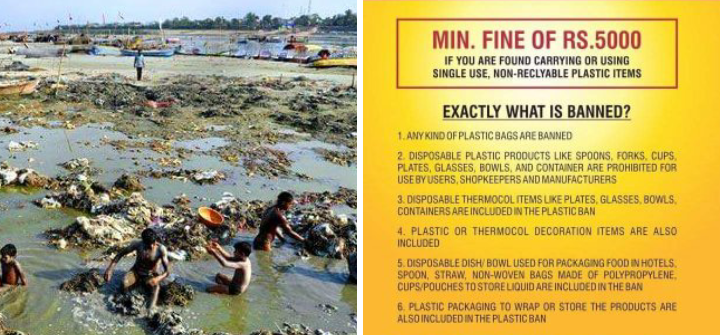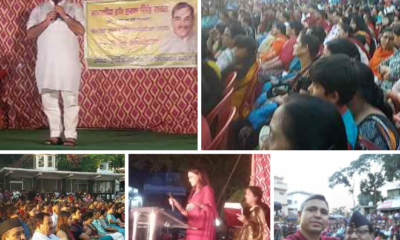Natural Resources
India produces a collosal 15000 tons of plastic waste, a greatest health hazard! Let’s give up plastics

The metropolitan cities of the country are becoming excessively overcrowded and so are other towns and cities of various states of the country.
The need for survival and non availability of job avenues compell them to throng these cities, towns and metropolises in uncontrollable numbers leading to overcrowded plains and hence excessive pollution.
The fastly depleting underground water table due to excessively enhanced water consumption and irregular rains due to global warming including massive withdrawal of underground water through electronic pumps by one and all have added to the problem multiply with no or negligible efforts or initiatives for warer conservation.
But despite all this, the uninterrupted and rampant use of plastic all over the country has assumed gigantic proportions and infinitely added to the already existing pollution woes.
India today is the highest consumer of the plastics amongst the countries of the globe despite Delhi and 17 other states having already banned the use of plastics.
The massive use of plastics through pakaging of food stuff, oils, garments, eatables, water and in other forms like plastic plates, spoons, cups and even water packets n thermocol etc in marriages and other homely functions nationally have become the hugest nuisance for the society and its population.
It’s usually said that a bottle of plastic takes over three hundred protracted years to vanish or perish and its hard plastic lids about 500 years and by the time if the use of these plastics would not be strongly countered and checked by the alternative use of soluble or perishable paper bags or jute bags compounded with the use of bamboo items etc our rivers and open drains including oceans may get converted into huge mounds or mountains of plastics.
What is more disturbing about this increasing menace is the fact that plastic production is a multi billion dollar industry worldwide with multinational companies and indigenous corporates in collaboration, earning extremely handsomely at the cost of the peoples’ health.
Lot is being said and talked about the emissions of green house gases destroying the ozone layer at the international forums but literally nothing is being talked about the rampant and uncontrollable use of plastic globally and there producers are none other but all those very countries who talk so much about lessening the green house emissions including our own politicians sitting at the helm of affairs.
Just implementing laws to ban plastic would in no way resolve this vexed issue playing with the environmental health of all the developed and developing countries of the globe but what we exactly needed is a global campaign against this dreaded menace to mobilise, awaken and enthuse populations to themselves desist from using plastics in their daily life and routine thinking considering it as the worst kind of cancer that is perrcolating expeditiously into our daily lives and the system that needs to be checked and countered extremely fast and with a duty oriented perception.
Let’ s talk of Maharashtra in this context. It has banned the use of plastic just yesterday through a legislation and Delhi did more than five years ago under the leadership of the then chief minister Shiela Dikshit imposing a heavy fine of Rs. 5000 on anybody using plastic.
But shockingly there is not an inkling of the terror of law on this count and even today the capital city of India is one of the hugest consumers of plastic as is Maharashtra, its economic capital Mumbai and several other states of the country, even those states which had banned the use of plastic quite before.
According to an editorial in HT quoting the report of the Central Pollution Control Board the Maharashtra government has enough reason to ban plastic : the state generates 1, 200 tonnes of plastic waste every day and Mumbai alone generates a collosal 500 metric tonnes which accounts for merely 10% of its total waste.
In contrast the Indian cities generate 15000 tons of plastic waste everyday of which 9000 tons is collected and processed/ recycled while the remaining 6000 tons go into the drains, blocking their incessant n seamless flow thus badly polluting the rivers into which these drains finally flow their highly toxic waste including in open streets, dumps and landfills.
So finally what’s the alternative to get rid of this huge menace that’s playing with the peoples’ health and environment. The answer is: our scientists should invent and innovate the credible alternatives to the use of plastics that are cheap and perishable and educating people creating in them the credible awareness to themselves, give up plastic though phasewise are some of the best alternatives.
The government should also stop the plastic production used in consumer durables phase wise, thus simultaneously producing the alternative materials to compensate for the shortage of plastics but with eco friendly alternatives, ofcourse. What’s your take friends?
































Niharika Ghia
June 27, 2018 at 4:08 PM
True